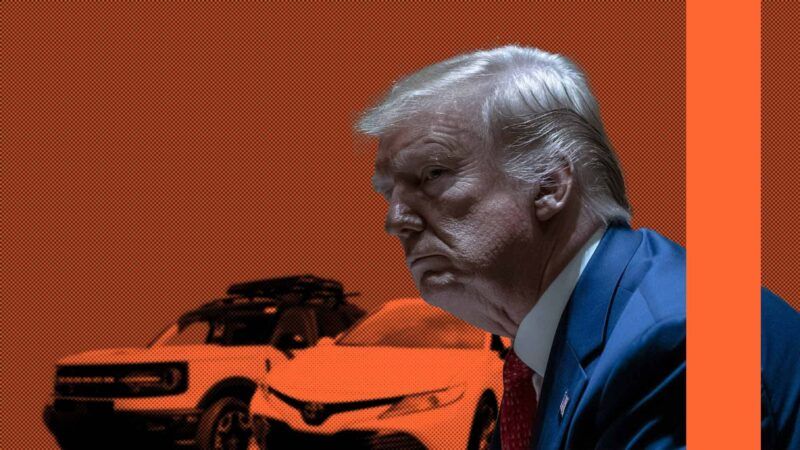Trump's Tariffs Are Already Raising Car Prices and Hurting Automakers
The results were completely foreseeable, after the president imposed 25 percent tariffs on all imported automobiles and parts.

President Donald Trump's unilaterally imposed tariffs continue to harm both domestic and global markets. Multiple automakers now expect lower profits and higher prices for consumers.
Reuters reported this week that as a result of Trump's tariffs, Ford Motor Co. will raise prices on three of its models by as much as $2,000 apiece. Days earlier, the company said it expected the tariffs to reduce annual earnings by $1.5 billion, even after making efforts to avoid U.S. import duties.
Rivian, which makes luxury electric vehicles from a single plant in Illinois, also announced this week that it expected to deliver fewer vehicles and spend more money this year as a result of the tariffs.
Then on Thursday, The New York Times reported that Toyota "predicted a $1.3 billion hit from President Trump's tariffs in April and May alone."
In a March executive order, Trump slapped a tariff of 25 percent on all imported automobiles, as well as automotive parts like engines, transmissions, and electrical components. The only exception was for those covered under the U.S.–Mexico–Canada Agreement (USMCA), in which case the tariff only applied to the portion of the vehicle's value not "attributable to parts wholly obtained, produced entirely, or substantially transformed in the United States."
The results were completely foreseeable: At the time, Cox Automotive chief economist Jonathan Smoke told The New York Times the tariffs could add $3,000 to even the price of cars made in the United States. This week, a Ford spokesperson told Reuters, "We have not passed on the full cost of tariffs to our customers."
As he often does, Trump says tariffs are necessary to support and reshore American manufacturing. "I couldn't care less if they raise prices," Trump told NBC News in March after implementing the tariffs. "I hope they raise their prices, because if they do, people are going to buy American-made cars."
"Anybody who has plants in the United States, it's going to be good for," Trump said when announcing the tariffs.
But Ford already has plants in the United States: The company brags that it "leads all automakers in U.S. production volume and exports." Indeed, 77 percent of the cars it sells in the U.S. are built here, with another 21 percent assembled in Canada and Mexico.
The same is true for Toyota: The Japanese automaker sold over 2.3 million vehicles in the U.S. last year, of which nearly half were assembled here and 27 percent were built in Canada and Mexico.
But even vehicles assembled in the U.S. aren't immune to tariffs. Fifty-one percent of U.S. imports are intermediate goods, meaning products used in the production of other goods. This includes auto parts like engines, which are also covered under Trump's 25 percent tariffs.
Trump clearly feels that all automakers who want to sell cars in America should build them in America, including all the parts that go into them. But that involves upending the way automotive manufacturing has worked for decades.
"The auto industry is global and has been built up around trade agreements that allow factories in different countries to specialize in certain parts or types of cars, with the expectation that they would face little to no tariffs," the Times reported in March. "That has been particularly true for North America, where national auto sectors have been stitched together by trade agreements since the 1960s."
As a result, cars and parts routinely jump back and forth across borders before making it to a dealership or to your driveway. For example, the Chevrolet Blazer is assembled in Mexico, but its engine and transmission are made in the States. The Toyota RAV4 is made in Canada, but 70 percent of its components—including engine and transmission—come from America.
In other words, automakers have spent decades deciding this is the most efficient way to build their products—only for Trump to decide otherwise, and impose his will by fiat.
Trump may believe that imposing enormous expenses on automakers will cause them to relocate production to the United States. That is highly ambitious at best, and it would take many years or even decades—during which time Americans would still be paying higher prices for cars simply because the president decided they should.


Show Comments (35)